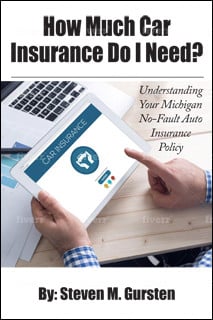Buying Car Insurance: Michigan Auto Insurance Guide
Michigan law requires all drivers to carry No-Fault insurance. This coverage is mandatory and provides great protections in case of a serious auto accident.
But we understand, buying car insurance to properly protect you can be confusing. The language in your Michigan auto insurance policy is very confusing. Even the names of the auto insurance policies can be confusing. That’s why our attorneys are providing this buying car insurance resource center, which lays out all of the coverage you need and additional options that can be life-saving.
Top 8 questions to ask when buying car insurance
This list of questions to ask when buying car insurance will help you understand your options and choose the Michigan auto insurance policy to best protect you.
Michigan car insurance laws and requirements
The 4 types of mandatory Michigan auto insurance coverage that you must have due to Michigan No-Fault law.
Types of car insurance coverage
A list of the different types of car insurance (both mandatory and optional) you can purchase in Michigan to protect yourself under various circumstances.
Uninsured and underinsured motorist coverage: Protects you in a crash with an uninsured driver
FAQs about UM and UIM and why you must have these valuable coverages.
What is collision insurance: Standard vs Broad Form vs Limited
Information on broad, standard and limited collision coverages, and how each can help you pay for your car damage in Michigan.
Mini tort for your car damage
How to get up to $1,000 (or up to $3,000 after July 1, 2020) of your vehicle damage paid under Michigan’s mini tort law.
Penalties for driving without insurance in Michigan
Learn about the serious consequences of skipping out on No-Fault insurance, and how doing so leaves you very vulnerable if you’re injured in a serious car accident.
What is PLPD insurance?
Personal Liability and Property Damage basically means that a person is carrying the auto insurance required by state law — without collision coverage. Learn about how it works in Michigan.
Coordination of benefits: coordinated vs uncoordinated benefits
The terms “coordinated” and “uncoordinated” describe how a person’s No-Fault PIP benefits are provided after a car accident. Here we explain how each applies to you.
How ERISA health insurance comes into play with coordinated No Fault benefits
Advice for car accident victims on how your ERISA health insurance plan could affect your right to No-Fault benefits.
How Much Car Insurance Do I Need?
The Best Insurance Plans for Your Family and What to Ask Your Agent







